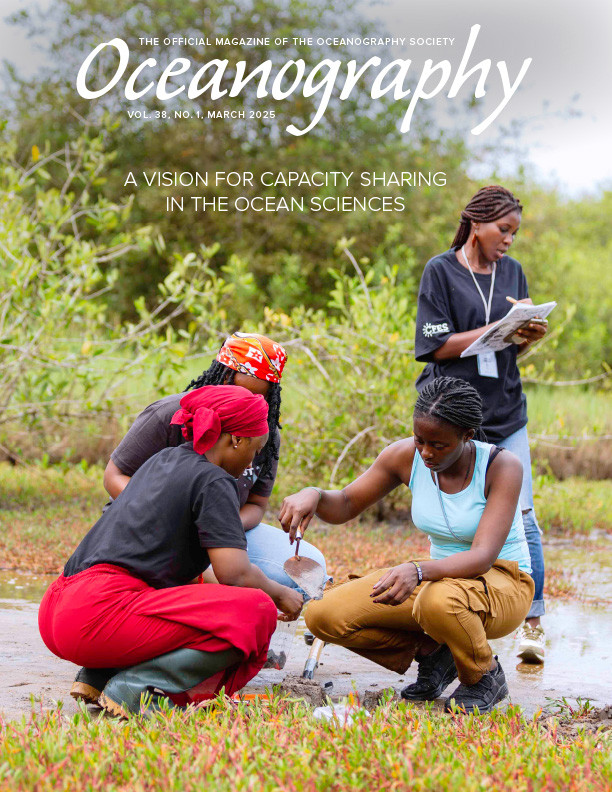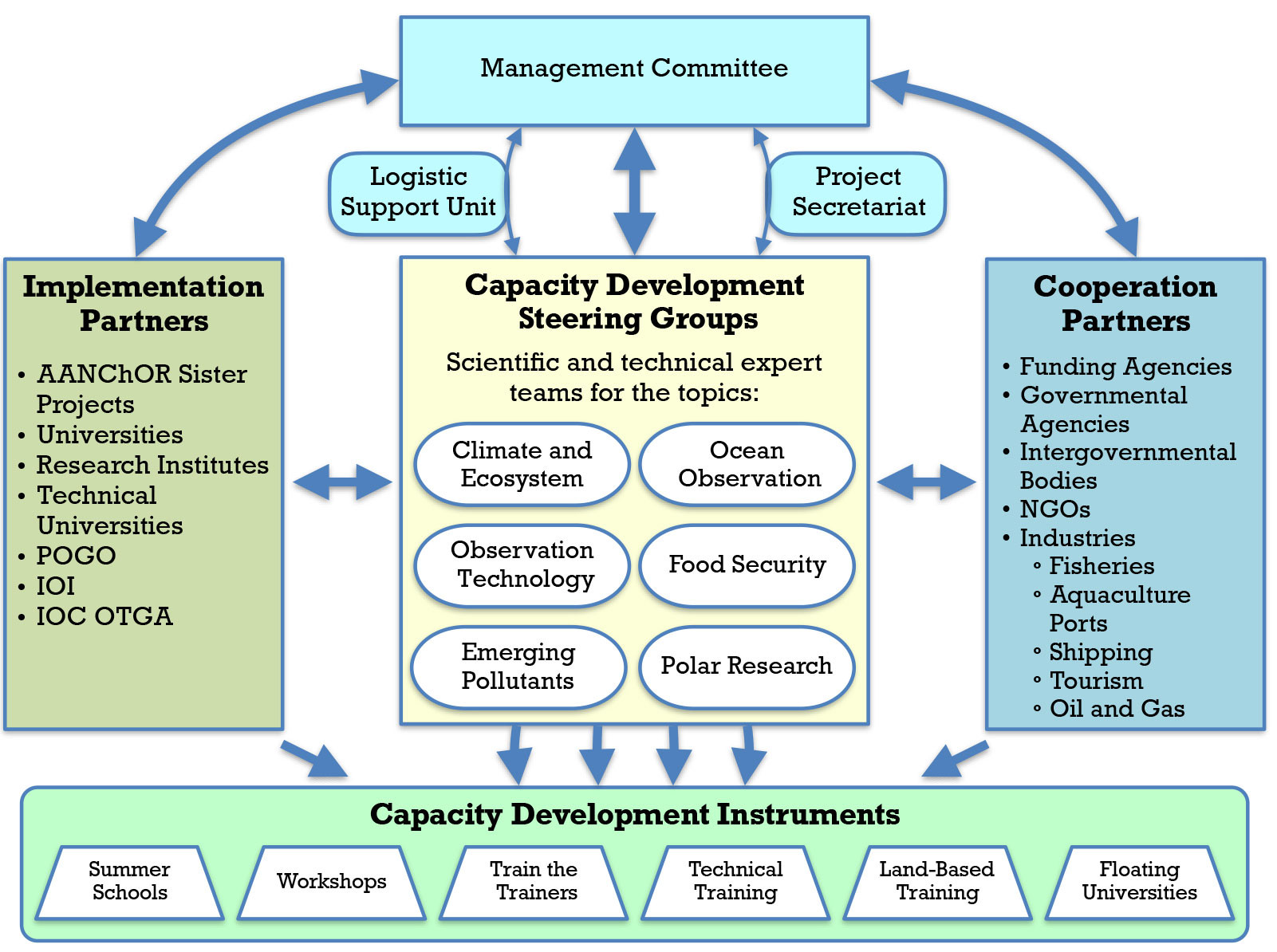Full Text
Introduction
Multidisciplinary and multinational cooperation is a prerequisite for success in marine research. The only way to establish sustainable global and regional management of the ocean is to view it as a whole and study all its different facets holistically. In addition to large-scale data collection, such studies require an exchange of knowledge, harmonization of laboratory and evaluation methods, and the mutual use of infrastructure. To further these goals, international training and education opportunities as well as work experiences need to involve underdeveloped regions in a meaningful and equal manner in order to reduce differences among national stakeholders, help promote the blue economy, and lead to better life conditions in a sustainable environment.
In contrast to the North Atlantic where there are a multitude of supra-national scientific (e.g., International Council for the Exploration of the Sea, ICES) and management bodies (e.g., OSPAR, Helsinki Commission [HELCOM], North East Atlantic Fisheries Commission [NEAFC], North Atlantic Fisheries Organization [NAFO]), institutional scientific collaborations in the South Atlantic or North-South Atlantic are few and often not sustained. Exceptions that reflect cooperative alliances of more than 10 years include the Benguela Environment Fisheries Interaction and Training program (BENEFIT, involving Germany, Norway, Angola, Namibia, and South Africa) that promotes North-South cooperation in research and capacity development, and the German Science Partnerships for the Assessment of Complex Earth System Processes (SPACES) program that promotes shared training and education opportunities in technical and academic areas. The 10-year SPACES for southern Africa program ended in 2022 without any followup, similar to several EU-funded projects with strong South-South components, for example, South and Tropical Atlantic Climate-Based Marine Ecosystem Prediction for Sustainable Management (TRIATLAS). Long-term commitments are scarce; the Ecosystem Approach to Fisheries (EAF)-Nansen Programme (Norway, Food and Agriculture Organization of the United Nations) is not specifically dedicated to capacity development; the Nansen-Tutu Centre as a joint Norwegian-South African project is specific to the country, as is the Ocean Science Center Mindelo, Cabo Verde, supported through the German Ministry of Research and Education.
All North Atlantic supra-national scientific and regional management bodies share a comparable history. For example, after an initial problem statement regarding overfishing (in the case of ICES in 1902 and NAFO in 1949) or pollution (OSPAR in 1972, HELCOM in 1974), respective international conferences laid foundations for the adoption of conventions and treaties leading to the formation of institutions mainly comprising three functional pillars: a commission representing the needs of contracting parties, a secretariat, and scientific working groups.
The structural deficit in the South Atlantic region is proving to be a strong obstacle for further All-Atlantic scientific progress, although the need for cooperation has been well acknowledged in respective political agendas. While in the North Atlantic the Galway Statement from 2013 strengthened the possibilities for cooperation between European and North American institutions, the Belém Statement of 2017, signed by Brazil, South Africa, Argentina, Morocco, and Cabo Verde, underpinned the need for more strategic partnerships with both South American and African partners, writing, “It is necessary to establish a platform and opportunities for scientific and technological cooperation resulting in joint activities and to promote and facilitate human capital development and scientific exchange.” In 2022, the All-Atlantic Declaration, while acknowledging achievements of the Galway and Belém statements in bridging the North Atlantic and the South Atlantic, strongly reinforced the need for sharing “knowledge, infrastructure, and capacity” as a means to enhance cooperative ocean science. However, we argue that means for cooperative ocean science are not equally accessible throughout the Atlantic, so that a cross-Atlantic platform for training and education for the whole Atlantic—an All-Atlantic Training Platform (AA-TP)—is very much needed, with the goal of dealing with inequalities for the South Atlantic. As such, capacity development is a central need in order to achieve United Nations (UN) Sustainable Development Goal (SDG) 14 (Conserve and sustainably use the oceans, seas, and marine resources for sustainable development) and the UN Decade of Ocean Science for Sustainable Development (2021–2030) for the whole Atlantic.
Proposed Structure for Organizing Capacity Development in the Whole Atlantic, AA-TP
Eight All-Atlantic conferences and forums were conducted from 2018 to 2024, now under the umbrella of the All-Atlantic Ocean Research and Innovation Alliance (AAORIA). The aim of AAORIA is to unite countries from both sides of the Atlantic Ocean to contribute “to the science needed to support ocean policy, governance, and management on domestic, regional, and international scales in the Atlantic region.” In terms of pressing research topics, the 2017 Belém Statement detailed specific areas of interest that were deemed important for the South Atlantic cooperation framework. The 2022 All-Atlantic Declaration then acknowledged these research needs.
The organization of capacity development for the whole Atlantic requires a logistic infrastructure to define strategic goals as well as coordinate activities. A management body should oversee the strategic program and represent interests and contributions of signatory countries. Together with steering groups, the management body should link with funding and cooperating institutions.
Steering groups would identify capacity sharing needs and articulate synergies in thematic topics as developed, for example, in the Galway and Belém Statements (see Figure 1, center block). The steering groups would be key for integrating ongoing activities.
|
|
Responsibilities of a structured platform for supporting this endeavor would include:
- Organizing communications
- Maintaining a data bank on training activities
- Providing a hub for information exchange between training providers and users
- Organizing board and steering group meetings
- Maintaining links to other Atlantic projects and enlarging the network to include other similar initiatives
- Organizing pilot training courses on selected topics
- Supporting third parties and fundraising from international and national organizations
- Compiling reports to member countries and stakeholders
- Providing logistics support
This AA-TP model was inspired by institutions such as the intergovernmental North Pacific Marine Science Organization (PICES), the university-based West African Science Service Centre on Climate Change and Adapted Land Use (WASCAL), and the World Meteorological Organization (WMO) Capacity Development Panel.
With the proposed structure, the AA-TP could successfully contribute to goals spanning the whole Atlantic such as (1) aligning and creating synergies among existing and future national, international, and EU training programs in the area of the blue economy, including industrial apprenticeship opportunities and networking, with both national programs in Atlantic countries and international programs, and (2) creating innovative and targeted approaches in capacity development for addressing ocean issues.
In terms of tailor-made solutions, the AA-TP could play a significant role in facilitating partnerships between universities and research institutions, given that in the applied sector much research is conducted by federal agencies. In the case of aquaculture, private-public partnerships could be enhanced in order to train personnel under production conditions.
Activities promoted by the AA-TP would be traditional land-based training (e.g., workshops, summer schools) as well as new forms as further developed in the All-Atlantic Cooperation for Ocean Research and Innovation (AANChOR) project.
Floating Universities. Where ship time is available, floating universities allow dedicated interdisciplinary research training opportunities that also cover many aspects of working at sea. As a result of the AA-TP proposal within the AANChOR project, the All-Atlantic Floating University Network (@SeaNetwork) was created. Of the AA-TP program components, only the floating universities were present at the 2024 All-Atlantic Annual Meeting. Their activities may complement others like the Atlantic Meridional Transect (AMT) project, which has provided seagoing research and training opportunities for young researchers since 1995 in the form of about 100 Partnerships for Observation of the Global Ocean (POGO)-AMT fellowships.
Technical Training. Technical training is partially land-based and may also include training specifically for seagoing technical personnel on handling and maintaining equipment and conducting analyses under rough conditions. Such training was first conducted in December 2022 at a multi-lateral AANChOR course held at the Department of Forestry, Fisheries, and the Environment’s Antarctica and Islands training facility in Cape Town, South Africa. The course introduced a range of oceanographic equipment, followed by demonstration of their use on a research vessel. More time at sea was identified as a future requirement for greater effectiveness.
Train the Trainers. An essential element of the training must be to anchor the knowledge imparted in workshops and summer schools in the regions for the long term. For this purpose, it is necessary to train multipliers who can effectively disseminate the knowledge gained and thus create an effective capacity development system in the regions. “Train the trainers” could be a key training goal and strategy. Here, too, a central coordinating platform such as the AA-TP is necessary and helpful for effective implementation.
Figure 1 shows a possible structure of an AA-TP as developed in the AANChOR project. However, the steering groups might be implemented as self-sustaining groups by interested scientists or institutions linking to international programs, funding agencies, or other bodies. A secretariat would be needed to link the steering groups and provide them with technical support.
Outlook
The AA-TP format provides a vision for future holistic capacity strengthening in the whole Atlantic, based on cooperation and interest. It is important to note that the All-Atlantic embracing objectives of the All-Atlantic Declaration are not matched by an All-Atlantic network of scientific cooperation and training, in particular, for the South Atlantic. Likewise, while five working groups of the Galway Statement-based Atlantic Ocean Research Alliance project (AORA) in the North Atlantic still persist, all AANChOR pilot projects ended by 2023. Furthermore, capacity building activities in the South Atlantic, except for the floating universities, were low on the agenda of the 2024 All-Atlantic meeting in Ottawa, Canada. One reason for this failure, as stated for another AANChOR pilot project, Joint Pilot Action Marine Biotechnology Initiative for the Atlantic (BIOTECMAR), could be the uncertainties in matching resources from developing countries (Thompson et al., 2024). Thus, in order to prevent there being only short regional lifespans for capacity development activities, they must be organized and provided under an institutional umbrella capable of being equally sustained in all regions of the Atlantic. The AA-TP format could provide tailor-made solutions for different topics, tasks, and countries. An AA-TP could play a significant role in facilitating partnerships between universities, research institutions, and federal agencies while acting as a cooperative partner for existing training programs provided by, for example, ICES, IOC (Intergovernmental Oceanographic Commission of UNESCO), or POGO. Given that much research in applied sectors such as aquaculture or ocean technology is conducted by federal agencies or industry, an AA-TP could further serve as a much-needed hub in the South Atlantic to establish or enhance private-public partnerships in order to train personnel under production conditions. As a first means for establishing an AA-TP in this region, the tropical and South Atlantic should be included in future research and international working programs to ensure that East-West and North-South cooperation in the Atlantic is maintained. For example, links to Brazil are intended to be established in the planned German Future West African Marine Ecosystem (FUTURO) project that includes significant capacity development elements, workshops, and conference plans. Important steps forward will be to identify an institution to host the AA-TP and long-term committed funding for the infrastructure.
Acknowledgments
This article is based on a white paper developed by a working group within the trans-Atlantic project AANChOR funded by the Horizon 2020 program of the European Commission (grant agreement No. 818395). The goal was to find a solution for a better and more effective organization of marine capacity development by setting up an All-Atlantic Training Platform (AA-TP) for the organization of capacity development measures in marine sciences in the Atlantic Ocean. We are grateful to Sigi Gruber for her engagement in the South-Atlantic cooperation, Sofia Cordeiros for her excellent project leadership, and all colleagues in Workpackage 3 “Capacity Development” of the AANChOR project, who have contributed their ideas, enthusiasm, and work to develop the concept of the “All-Atlantic Training Platform – AA-TP.”


